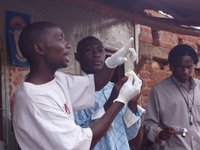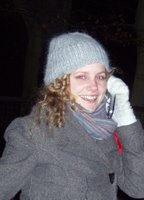 Last Friday I heaved a long sigh of relief as a training course that I’d organised for the peer educators came to an end. Looking back it was pretty successful but first I’ll have a little rant…
Last Friday I heaved a long sigh of relief as a training course that I’d organised for the peer educators came to an end. Looking back it was pretty successful but first I’ll have a little rant…We kicked off on Tuesday morning behind schedule as expected but by 10am fifty peer educators were crammed into a hall no bigger than the average British classroom. My first task was to explain that there wouldn’t be any ‘sitting allowances’, lunch or handouts provided. Kwacha Kum’mawa had asked if I would arrange a refresher course a couple of weeks ago and asked if it could start within the following two weeks. I made it clear from the beginning that there’s no money whatsoever for such an event therefore we’d do it over five mornings so that the participants could go home for lunch. I repeated a number of times that there would be no handouts, no t-shirts or caps and they would have to provide their own pens and paper. Through gritted teeth they agreed that they wanted the training anyway.
So, you can imagine my disappointment when, on the first morning, I ask the participants to write down their expectations of the course and at least 75% of them write ‘t-shirts’ ‘sitting allowance’ ‘lunch’ or something to that effect.
It seems that lots of money is spent on workshops in Zambia. In fact, more time and energy is spent going to training courses than actually putting into practice whatever it is that is learnt. And the norm seems to be to provide all the above and more. I told the peer educators that if they had come along to the course to get lunch or money then they were in the wrong place and should leave …unsurprisingly no one moved a muscle.

Day one got off to a good start but descended into a fairly heated debate when I asked them whether they agreed or disagreed with a few controversial statements such as ‘you should not have sex before marriage’ and ‘HIV positive people should not be allowed to use public swimming baths’. My heart sank when a majority of the participants agreed with the statement ‘women who carry condoms are cheap and easy’. It sank further when I asked if they agreed that ‘men who carried condoms are cheap and easy’ and most shifted to the other corner of the room to signify their disagreement. Holding back my disapproval, I asked them to justify their opinions, to which they began their answers, ‘well, you have to understand here in Zambia…’ followed by statements such as ‘men make the decisions’ and ‘contraception is a man’s responsibility’.
It didn’t take long to realise that my assumption that peer educators would automatically challenge such beliefs was completely naïve and that if I voiced my disagreement it would be met with cries of ‘but things are different in Britain.’ So after the first day I went home feeling pretty disillusioned; many of the so-called peer educators were not the shining role models I’d assumed.
At this point I should add that many of them are brilliant, intelligent, enthusiastic and motivated young people who believe truly in challenging gender stereotypes, shout loudly about the benefits of condom use and work their socks off for little or no reward. And I think after four days of thrashing out their ideas with each other more and more can be included in this category.
The Programme Manager from Tikondane, who’s a nurse by profession, facilitated most of day two on the subject of STIs. And if the pictures of horrendous STI symptoms don’t put the peers off of having unprotected sex nothing will!
I’d dedicated much of day three to what is slowly becoming my favourite topic of conversation – condoms. During feedback on what are the advantages, disadvantages and myths about using both a male or female condom I took the chance to challenge their beliefs about those who carry condoms. I asked if we could add ‘all women who carry condoms are cheap and easy’ to the myths list, to which there were no objections. Now, I’m utterly baffled, have they all changed their minds in under 48hours and the training course is having a real impact? Or perhaps I’d scared them into submission or maybe they were all playing devil’s advocate on day one? Either way, I got my statement up on the myths board and told them that I thought women who carry condoms are intelligent, sensible and strong individuals. That’s got to be a good start. I’ve just finished reading all the evaluation forms and ‘knowing how to use a condom’ came top of the things that they had learnt during the workshop…result!
 On the final day I handed the floor over to the coordinators from
On the final day I handed the floor over to the coordinators from Kwacha and Tikondane who got all the boys drawing the female reproductive organs and the girls doing the opposite. Thank God I was allowed to sit out of this one; the boys could name parts of my own body that I never knew existed – utter shame!
Kwacha and Tikondane who got all the boys drawing the female reproductive organs and the girls doing the opposite. Thank God I was allowed to sit out of this one; the boys could name parts of my own body that I never knew existed – utter shame! And just in case any of you need a brilliant energiser to kick start a boring office meeting try this with your colleagues.
- Ask everyone to think of a company motto such as ‘Sainsbury’s….making life taste better’ or ‘Nike…just do it!’
- Now ask someone stand in the centre of the group and replace the company name with ‘under my pants…’
- The sentences should go something like this ‘under my pants…making life taste better’ or ‘Bostik…the wonder product with 101 uses’.

It’s a great way to break down barriers!
.JPG)
.JPG)
.JPG)




